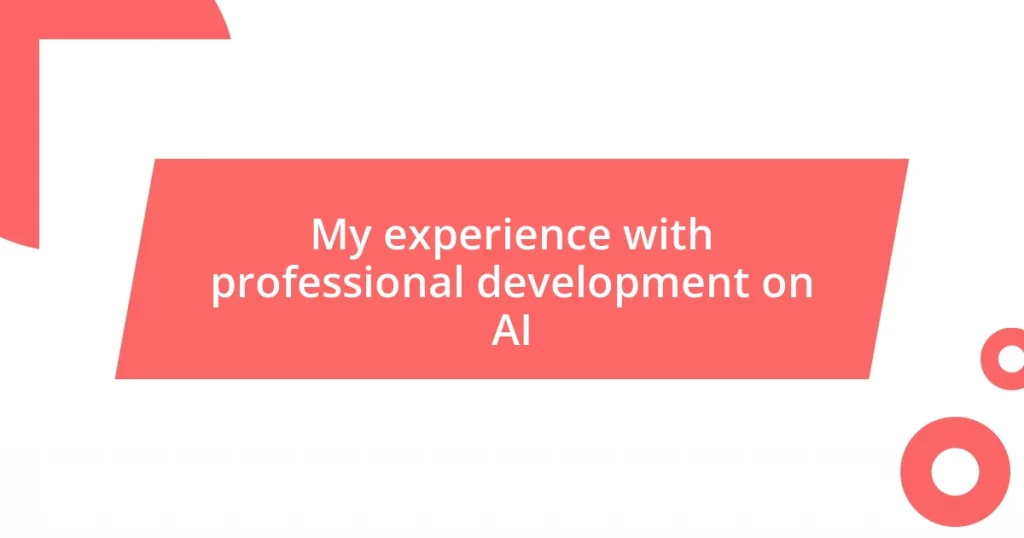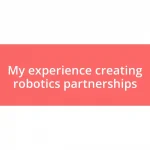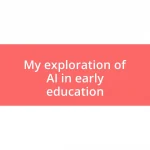Key takeaways:
- Hands-on learning through projects and workshops is crucial for developing practical AI skills and nurturing a problem-solving mindset.
- Choosing the right AI courses that align with personal goals and learning styles enhances the educational experience and promotes deeper understanding.
- Networking within the AI community fosters collaboration, mentorship, and opportunities for personal and professional growth.
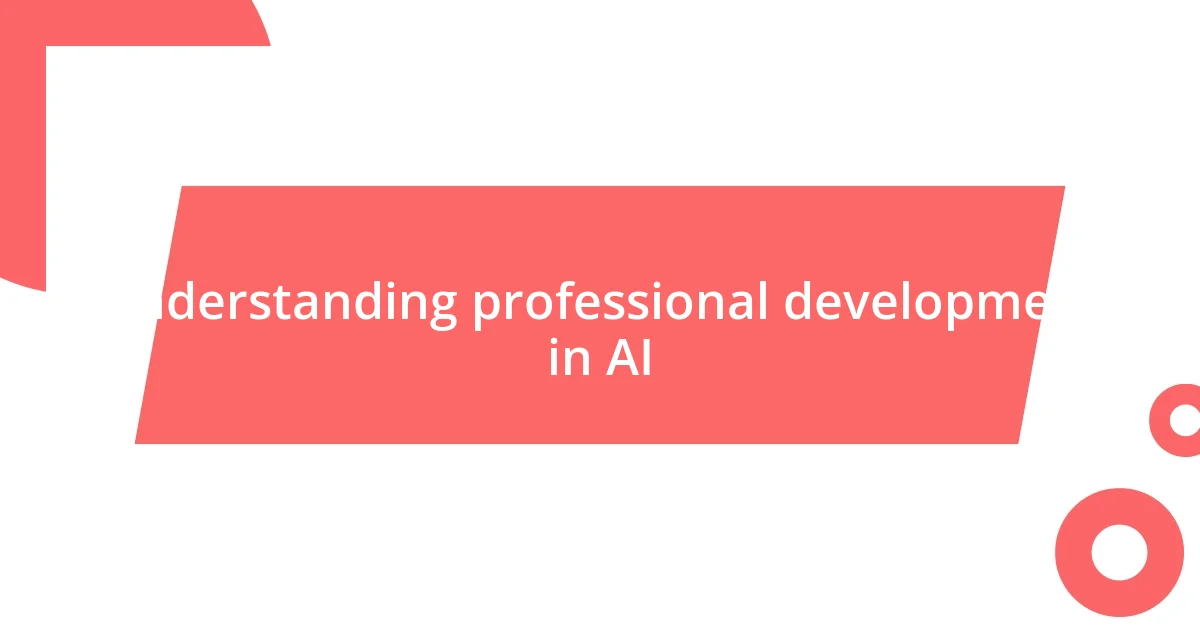
Understanding professional development in AI
Professional development in AI is a journey that’s as exciting as it is complex. When I first dived into this field, I was amazed by the sheer breadth of knowledge required. Have you ever felt overwhelmed by the rapid pace of technological change? I certainly did, but this challenge lit a fire in me to learn more.
One of my most impactful experiences was attending a hands-on workshop focused on machine learning. It was here that I saw firsthand how theory translates into practical application. The thrill of turning data into insights was exhilarating. I remember the rush of excitement as I solved a problem using algorithms, and I realized then that training in AI isn’t just about learning new tools—it’s about cultivating a mindset of continuous exploration and adaptation.
The emotional aspect of professional development cannot be overlooked either. There have been moments of frustration where I’ve hit a wall, but those moments often led to breakthroughs. It’s all about embracing the struggles, don’t you think? After all, every stumble in learning is a step closer to mastery.
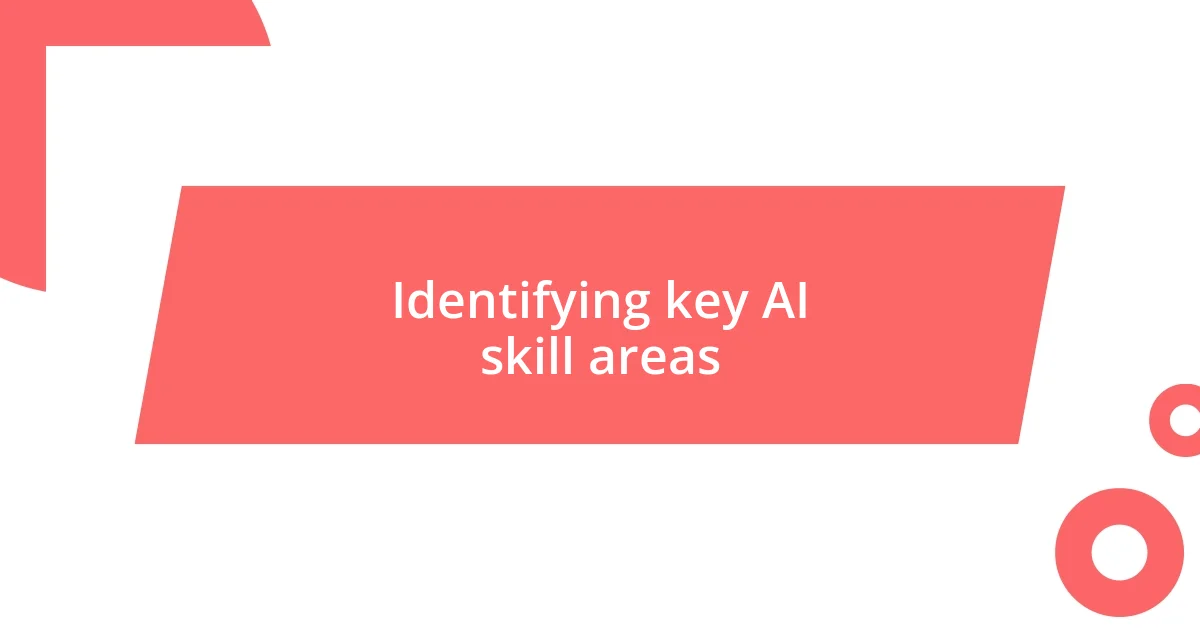
Identifying key AI skill areas
Identifying the key skill areas in AI can feel daunting, but I found it to be an enlightening process. During my training, I realized that breaking down the vast landscape into manageable components allows me to focus and thrive. It’s like trying to learn a new language; tackling the grammar, vocabulary, and pronunciation separately helps solidify the foundation.
Here are some key areas I recommend focusing on:
- Machine Learning: Understanding algorithms and their applications is crucial. I recall a challenging project where I had to implement supervised learning. The satisfaction when my model improved accuracy was incredible.
- Data Analysis: The ability to draw insights from data is invaluable. I remember spending late nights analyzing datasets; it felt like piecing together a puzzle.
- Natural Language Processing (NLP): This area fascinates me and has real-world applications. I once created a simple chatbot, which ignited my passion for how machines understand human language.
- Ethics in AI: Addressing ethical concerns is becoming increasingly important. When I read about biased algorithms impacting people’s lives, it motivated me to ensure my work promotes fairness.
- Programming Skills: Familiarity with languages such as Python or R is fundamental. I often revisit coding tutorials to refresh my skills, ensuring I’m well-prepared for evolving technologies.
Reflecting on these areas continually helps me refine my training objectives while keeping me engaged in the learning process.
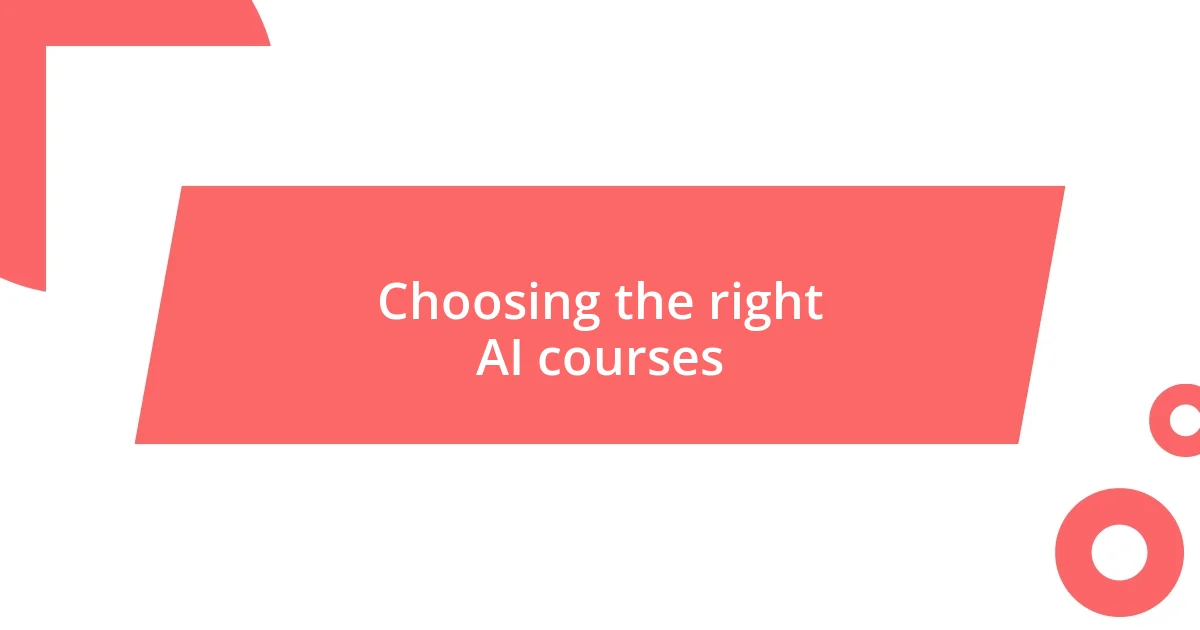
Choosing the right AI courses
Choosing the right AI courses can feel like navigating a labyrinth, but I’ve found that clarity comes when I assess my goals. A course should align with my current skill level and future aspirations. For instance, I once enrolled in an introductory AI course that felt too simplistic after a few weeks. I learned that it’s essential to evaluate if the course content challenges me, rather than offering a comfortable revisit of what I already know.
When I choose between online platforms, I reflect on what suits my learning style best. Some individuals thrive in a self-paced environment, while I prefer courses with interactive elements. I took an interactive course on deep learning that included real-time collaboration with peers, boosting my motivation tremendously. Those group discussions led to enlightening moments, and I can still remember the joy of debugging code with friends across the globe!
Lastly, it’s important to check the course reviews and instructor experience. The best courses are often those taught by industry professionals who bring practical insights into the classroom. I once switched courses after reading reviews, and that decision transformed my perspective on AI. The knowledge I gained from an expert with years of experience in the field was worth it!
| Criteria | Considerations |
|---|---|
| Course Level | Ensure it matches your current expertise |
| Learning Style | Choose based on whether you prefer self-paced or interactive formats |
| Instructor Experience | Look for courses led by professionals with real-world insights |
| Course Reviews | Check feedback from previous students for guidance |
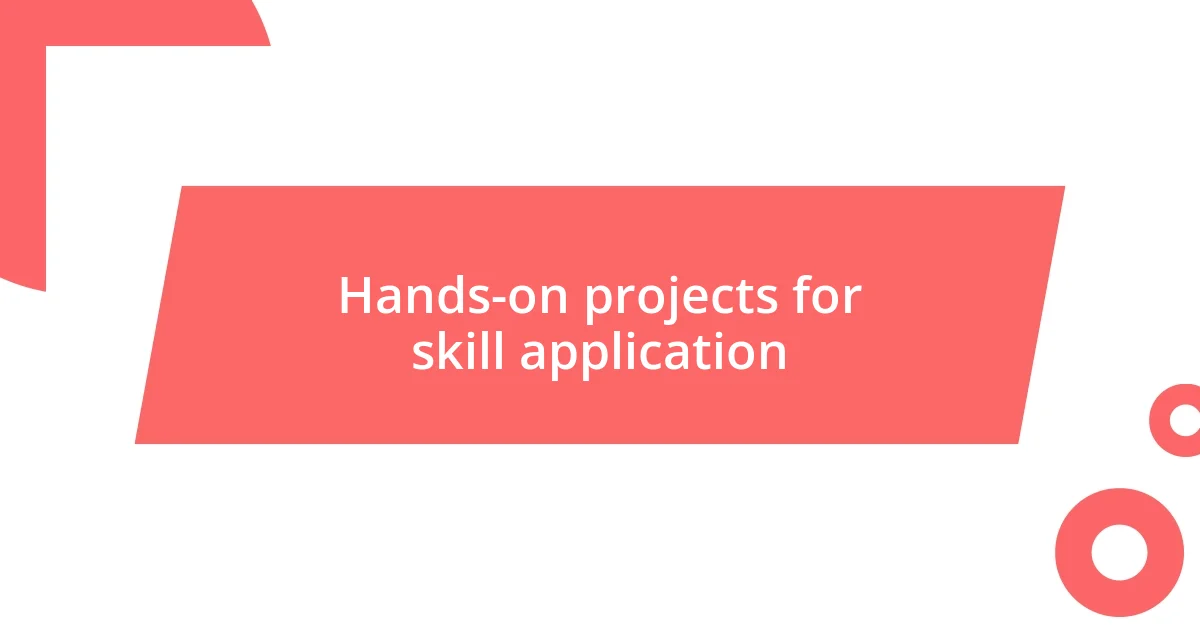
Hands-on projects for skill application
Working on hands-on projects is one of the most effective ways to translate theoretical knowledge into practical skills. I recall diving into a project that involved developing a machine learning model to predict housing prices. The thrill of assembling the data, fine-tuning the algorithms, and seeing my prototype deliver accurate results was exhilarating. It felt rewarding in a way that mere studying never could match. Don’t you think that experiencing the challenges firsthand enhances your understanding more than just reading about them?
Engaging in collaborative projects can take your learning to the next level. A particularly memorable experience for me was when I teamed up with a group to create a sentiment analysis tool for social media data. We each brought different skills to the table — from coding to data visualization — and our brainstorming sessions were electric! I often found myself more excited about the exchange of ideas than the actual outcome of the project. It taught me that working alongside others not only broadens your knowledge but also ignites creativity.
I’ve also realized that real-world applications make the learning process more relatable and meaningful. For instance, I participated in a hackathon with a focus on developing an ethical AI solution for mental health. The urgency of creating something impactful pushed me to think critically about the ethical implications of AI technologies. I still think back to how the experience impacted my approach to project work, reinforcing the idea that when you invest your skills in meaningful projects, the rewards multiply in personal growth and satisfaction.
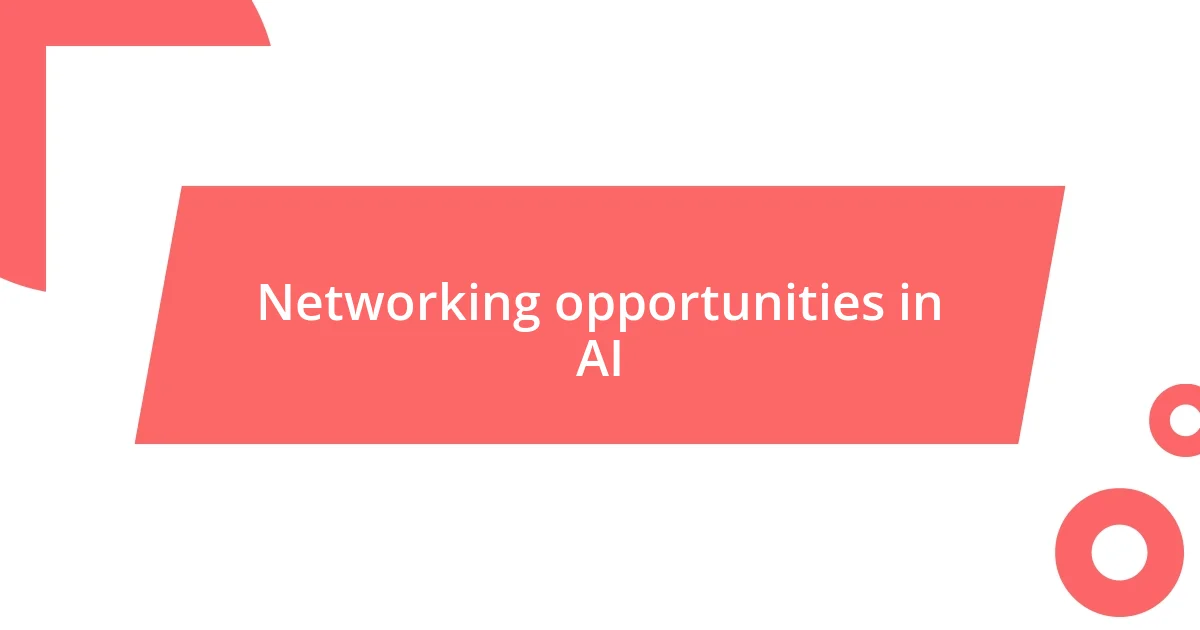
Networking opportunities in AI
Expanding your professional network in the AI field offers incredible opportunities to learn and grow. I remember attending an AI conference where I was fortunate enough to sit next to a researcher who was making waves in natural language processing. That spontaneous conversation not only sparked my interest in her work but also led to an invitation to collaborate on a small research project. Isn’t it amazing how a single interaction can open doors you never even considered?
Joining online communities can also be transformative. I became active in several AI-related forums and found that sharing challenges and solutions with like-minded individuals fostered a real sense of camaraderie. One evening, I received a message from a fellow programmer thanking me for a code snippet I posted—it turned into a mentoring relationship that benefits both of us. Have you ever thought about how simply contributing can create meaningful connections?
Lastly, local meetups can be a delightful way to network. I attended a small gathering focused on ethical AI, and the conversations were rich and thought-provoking. Sharing dinner with professionals who were equally passionate about ensuring responsible AI development ignited a spark inside me. Networking doesn’t just expand your contact list; it fuels your passion and drives your career forward. When’s the last time you’ve engaged with people who genuinely inspire you?
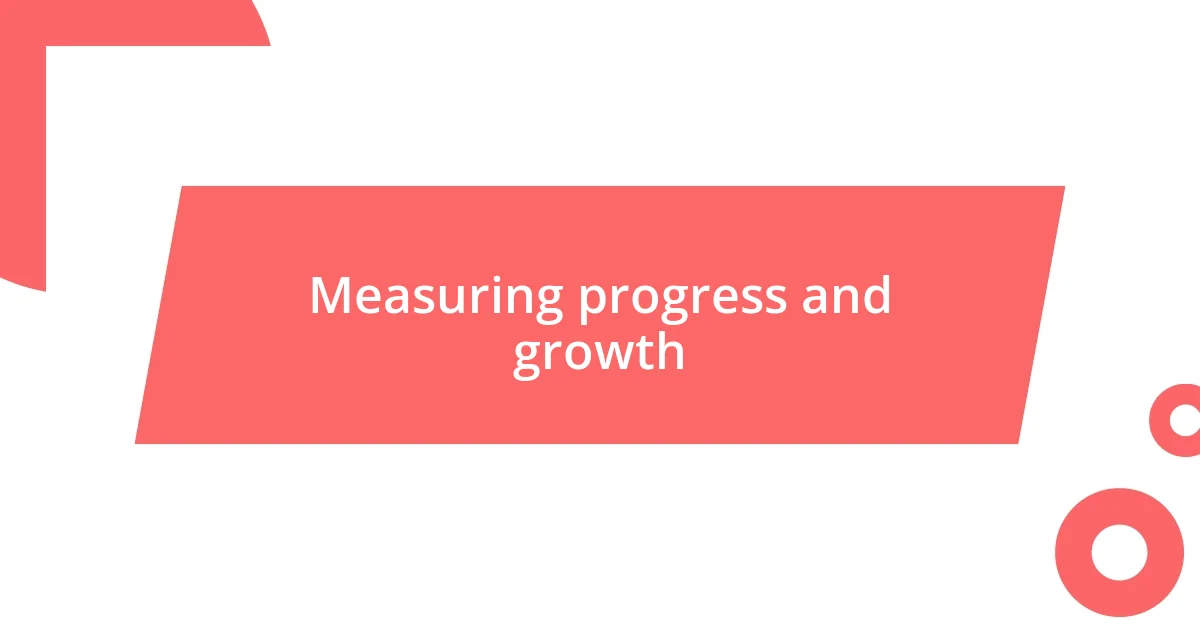
Measuring progress and growth
Reflecting on my journey, measuring my progress in AI development often took the form of tangible milestones. I vividly remember setting personal benchmarks, like mastering a new machine learning algorithm or successfully deploying my first web-based AI application. Each small victory felt like a celebration, and honestly, those moments of triumph fueled my passion for learning even more. Don’t you find that celebrating small wins can create a powerful motivation to keep pushing forward?
As I delved deeper into professional development, I began to appreciate the role of feedback in my growth. Seeking constructive criticism from peers and mentors transformed my understanding of my own capabilities. I still recall a critical piece of advice I received during a code review—it ignited a light bulb moment for me. Have you ever experienced a moment where someone’s perspective reshaped your approach? For me, it was a game changer that led to a more refined coding style and an eagerness to learn from mistakes.
Another significant aspect I considered was tracking the application of my new skills in real-world scenarios. I created a habit of documenting my projects in a portfolio, which not only highlighted my achievements but also allowed me to reflect on what I learned. Each entry was a reminder of the challenges I overcame and innovations I birthed. In an ever-evolving field like AI, isn’t it essential to have tangible evidence of your growth? This practice not only boosted my confidence but also prepared me to demonstrate my expertise to future collaborators and employers.










